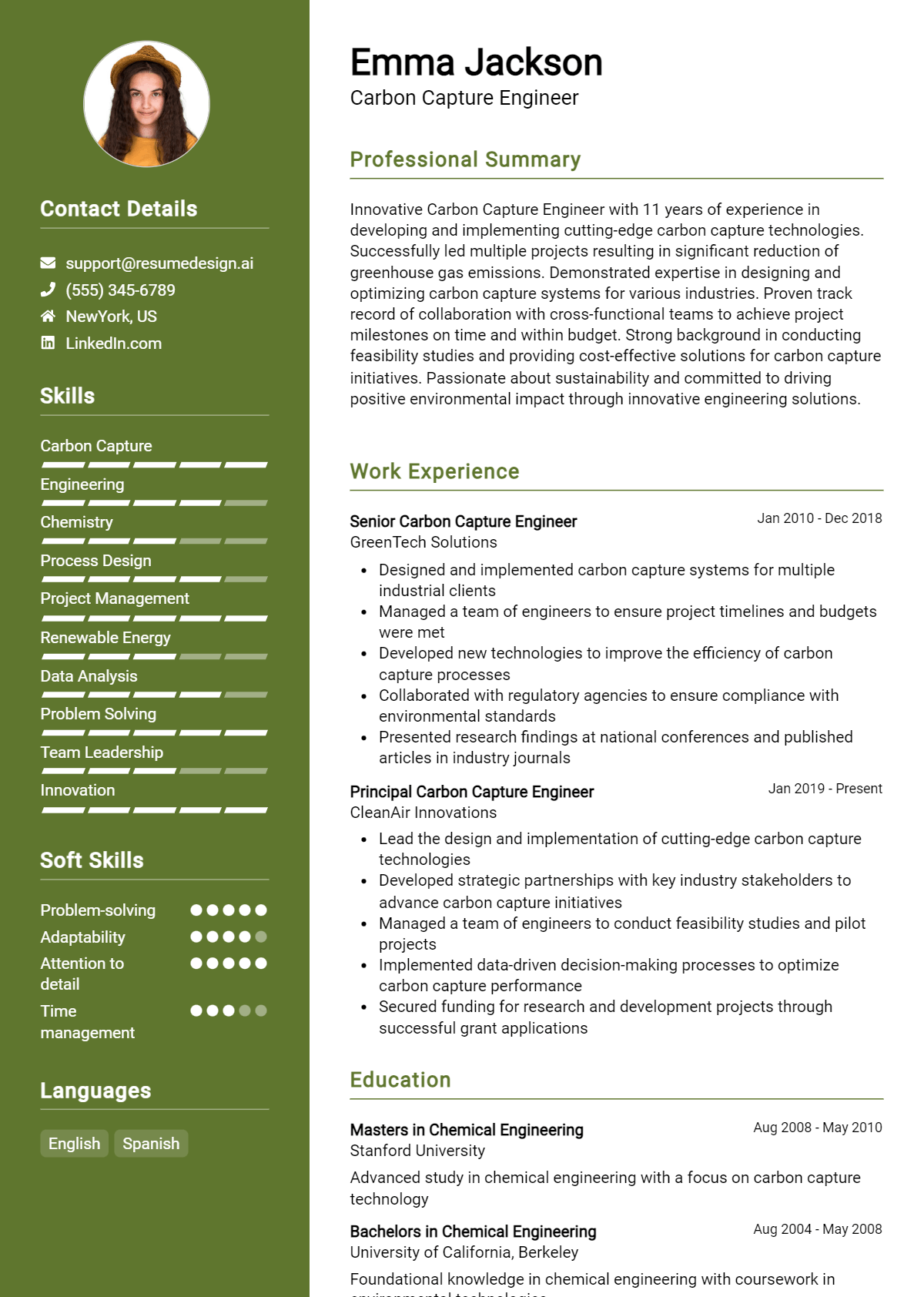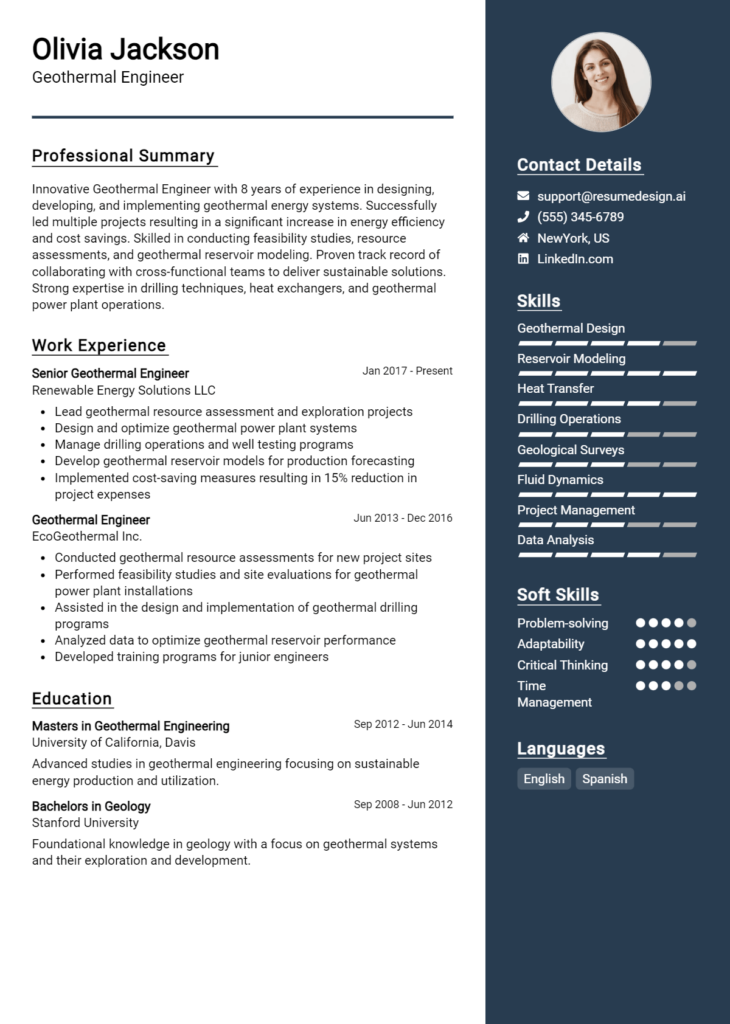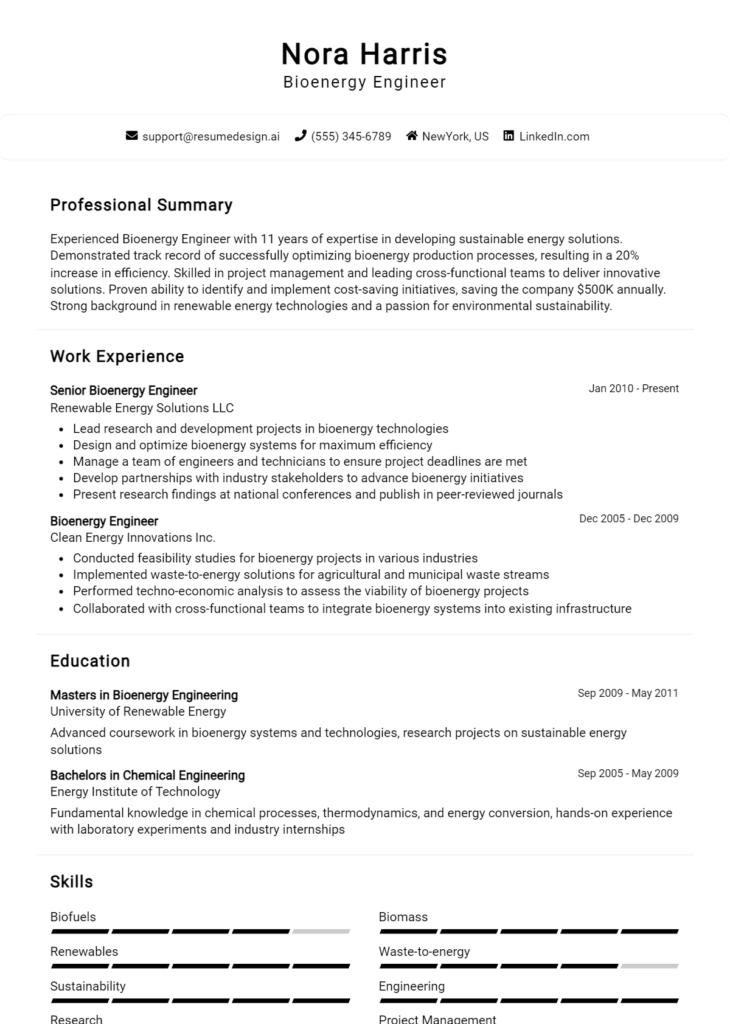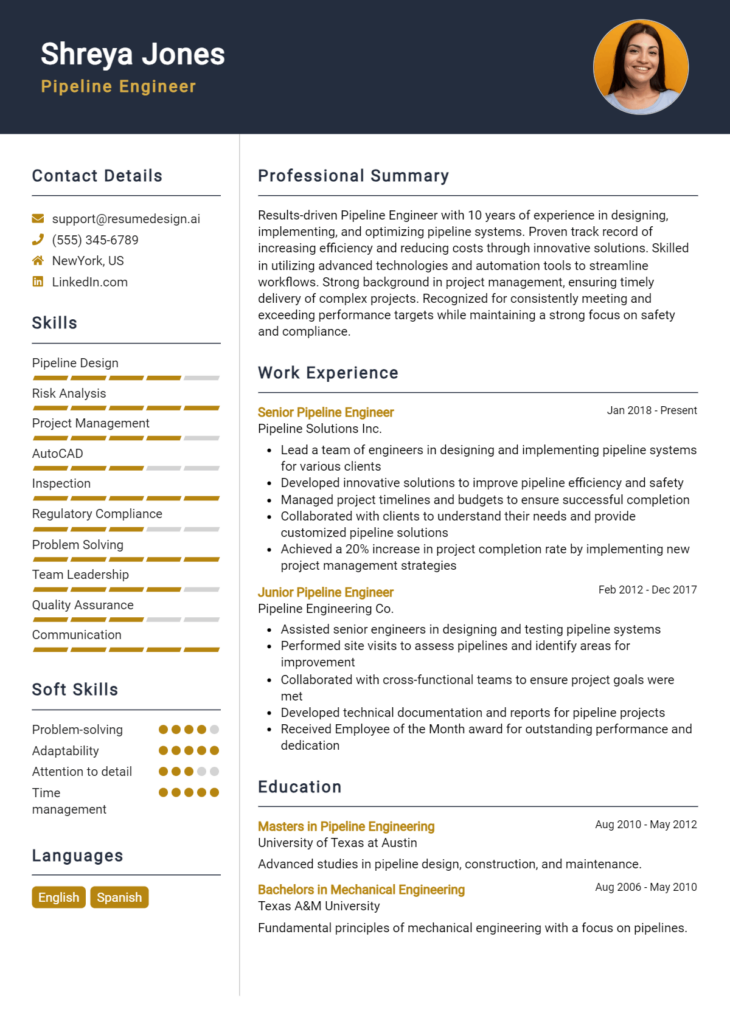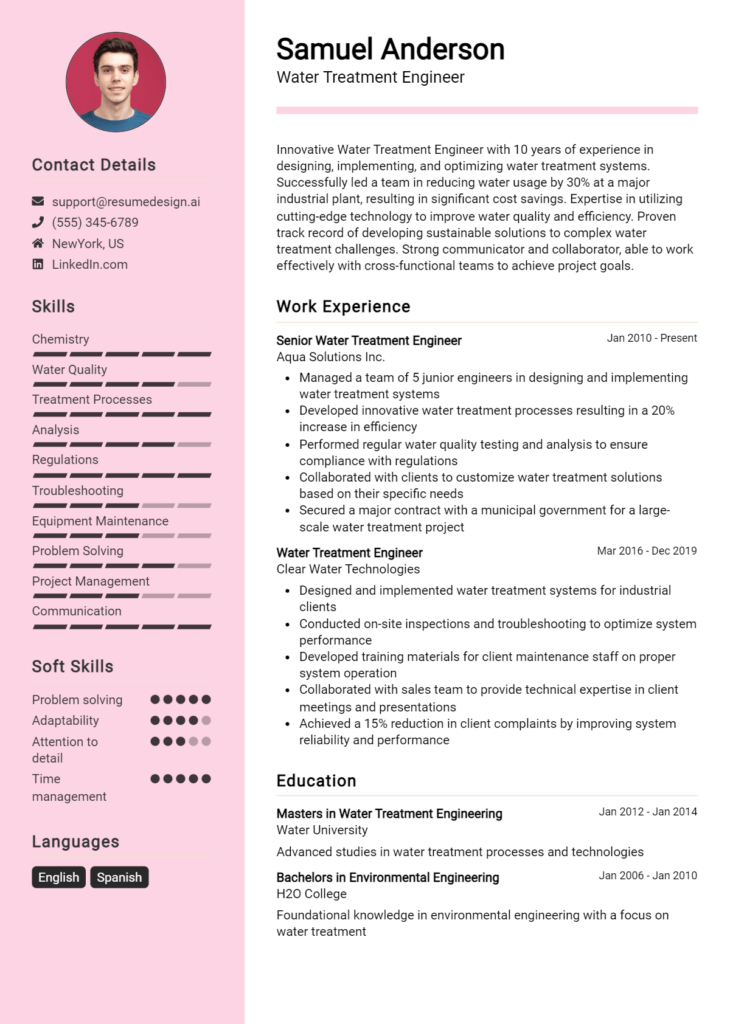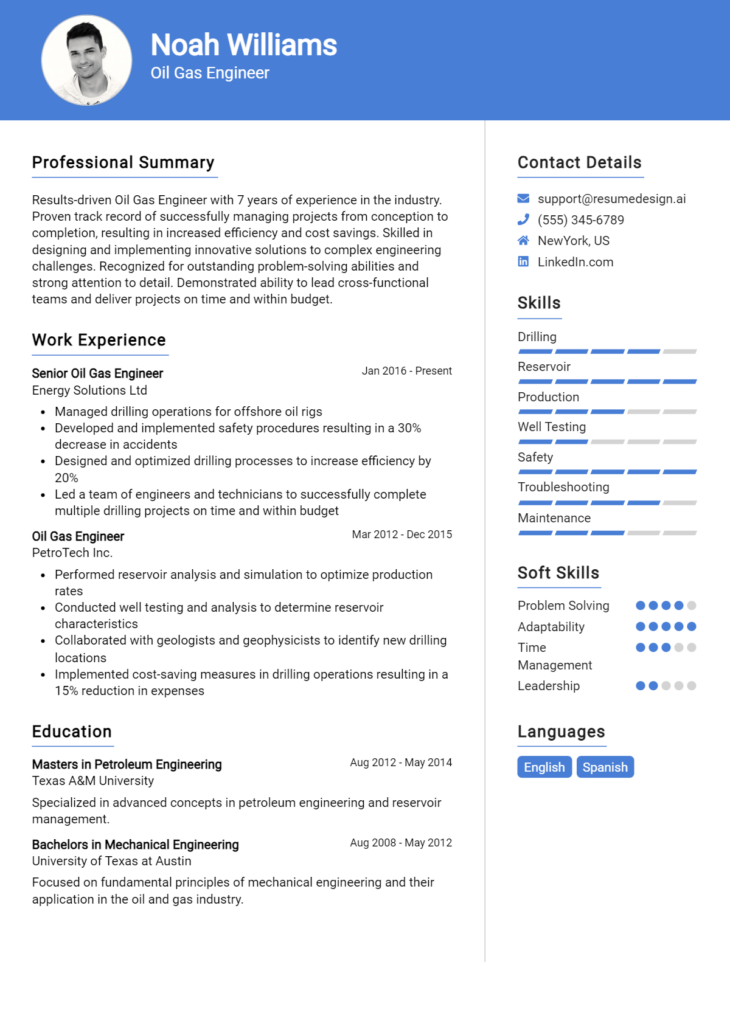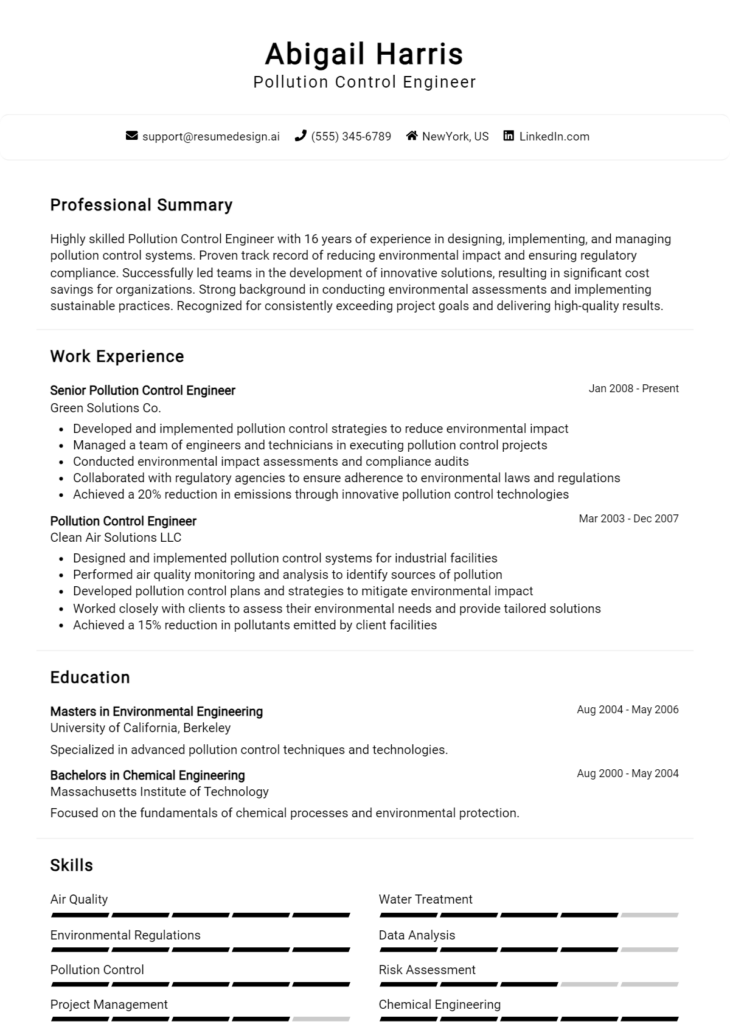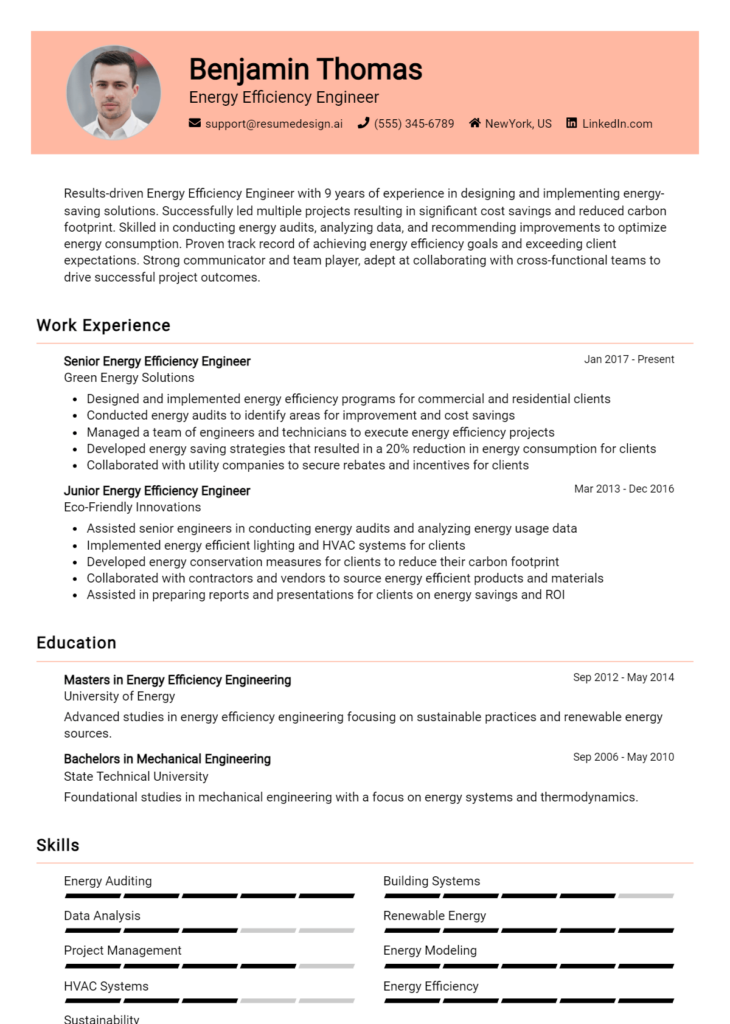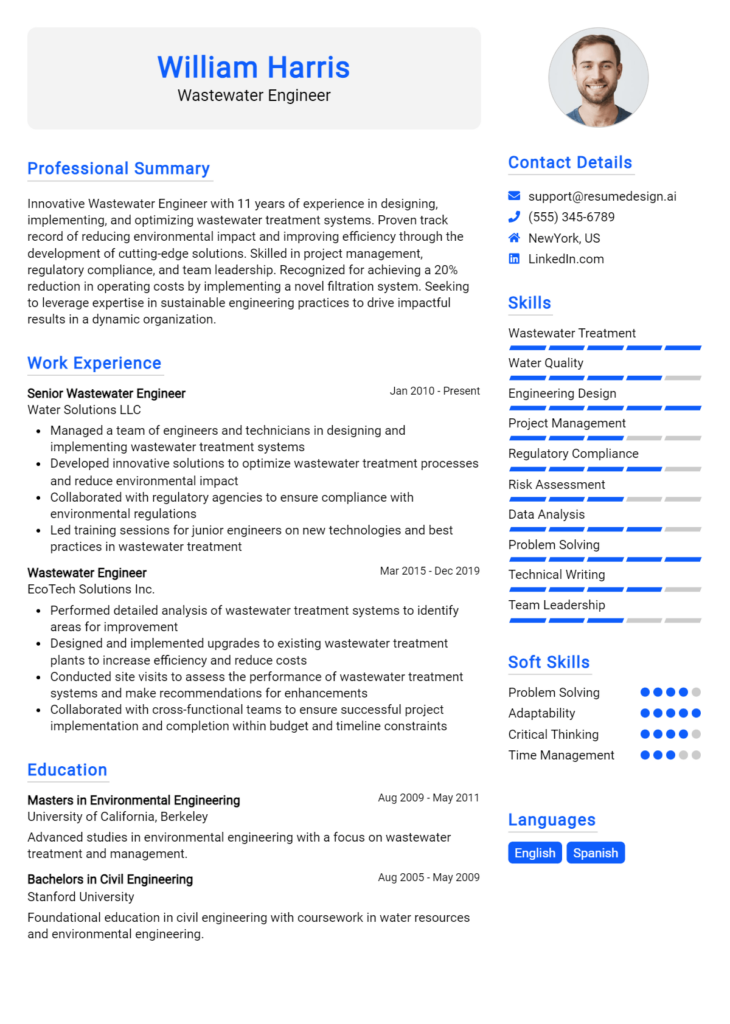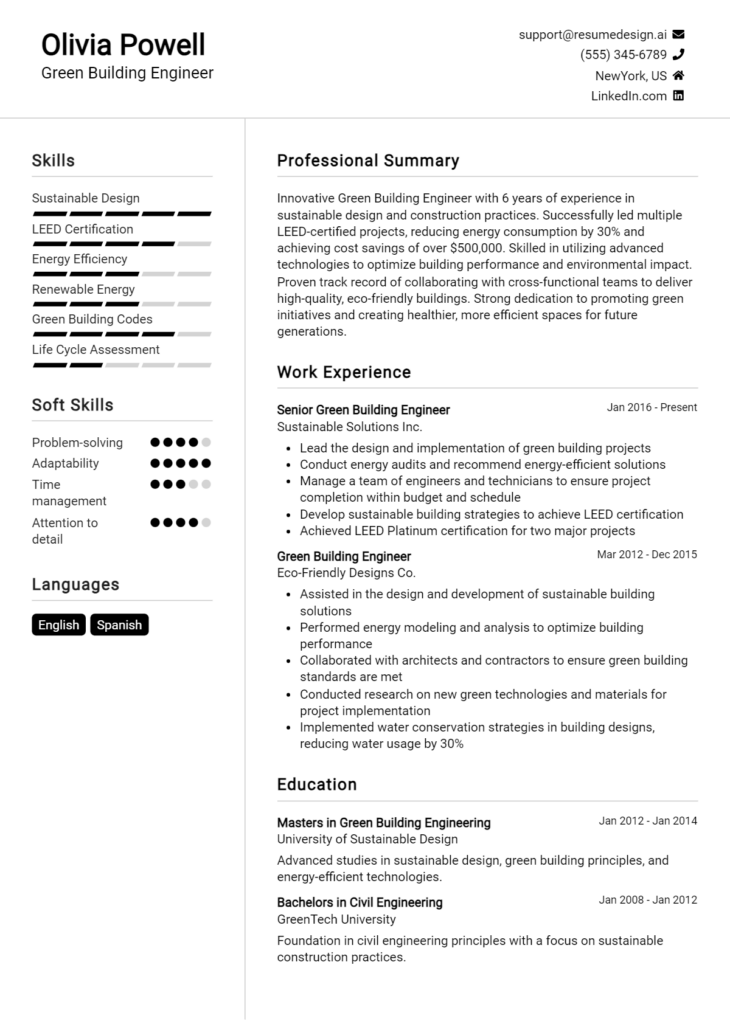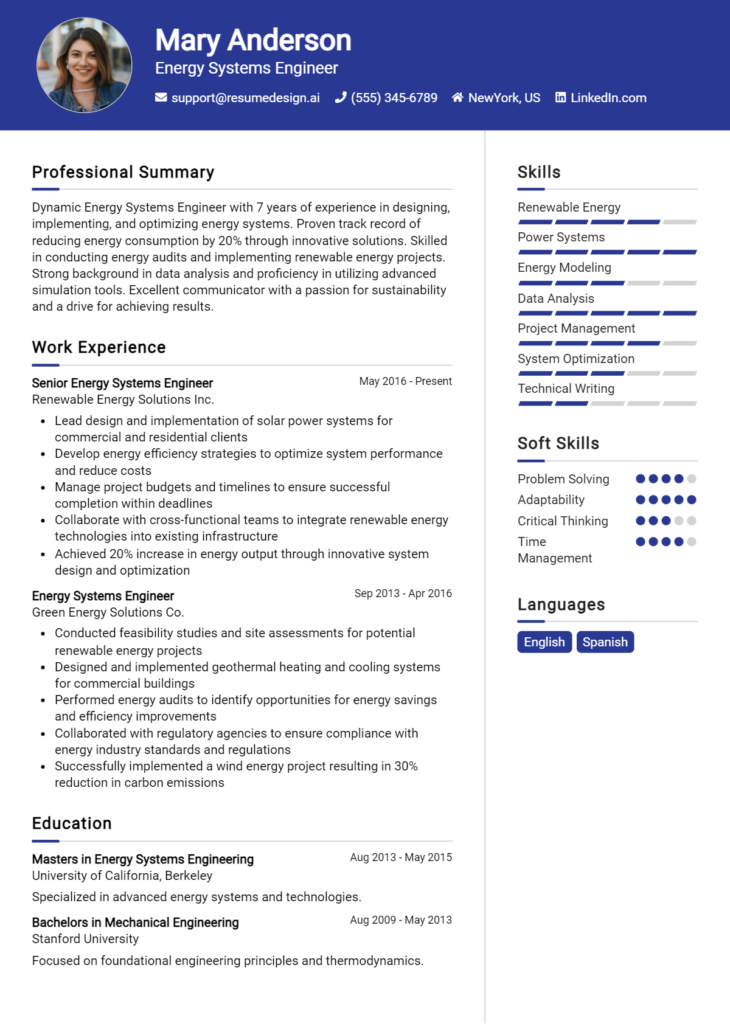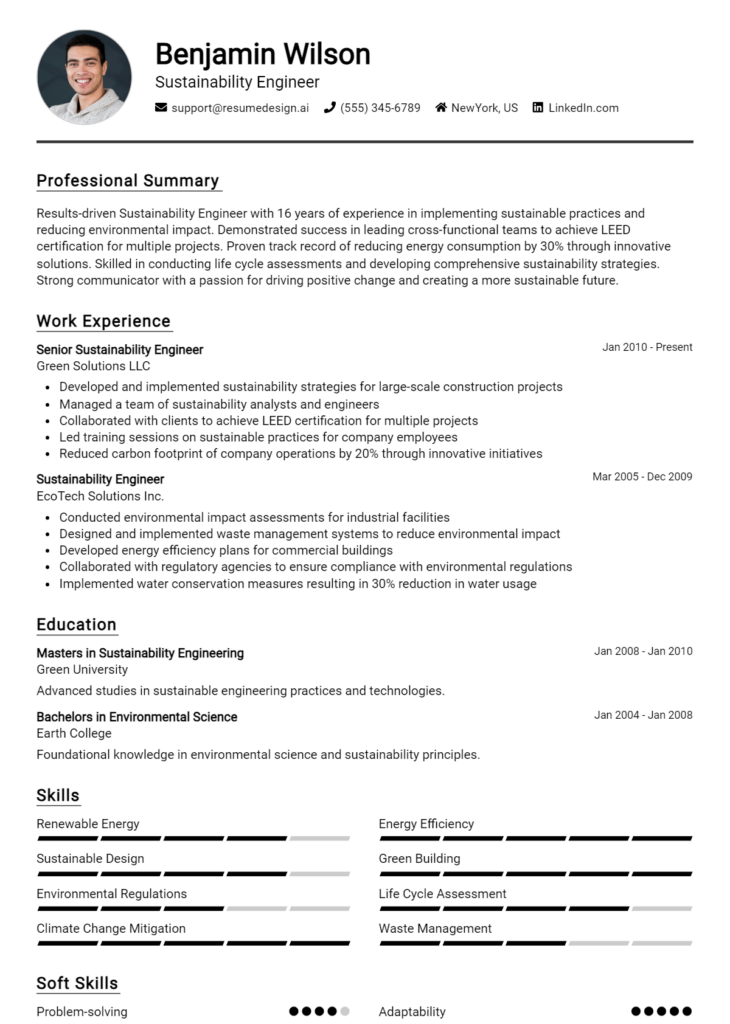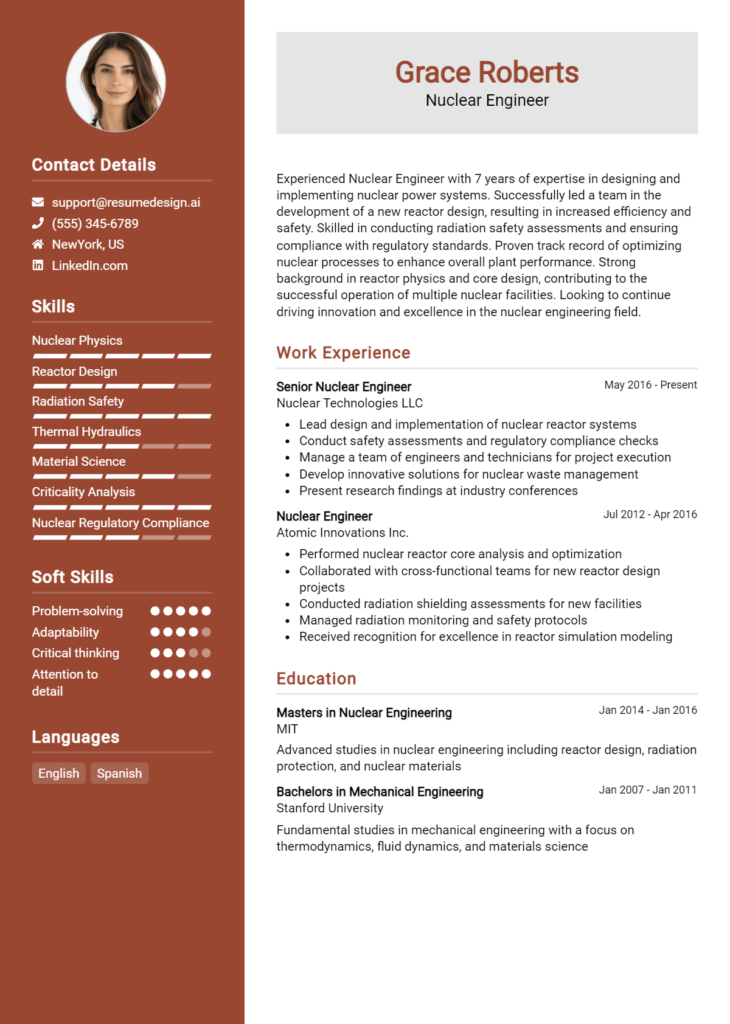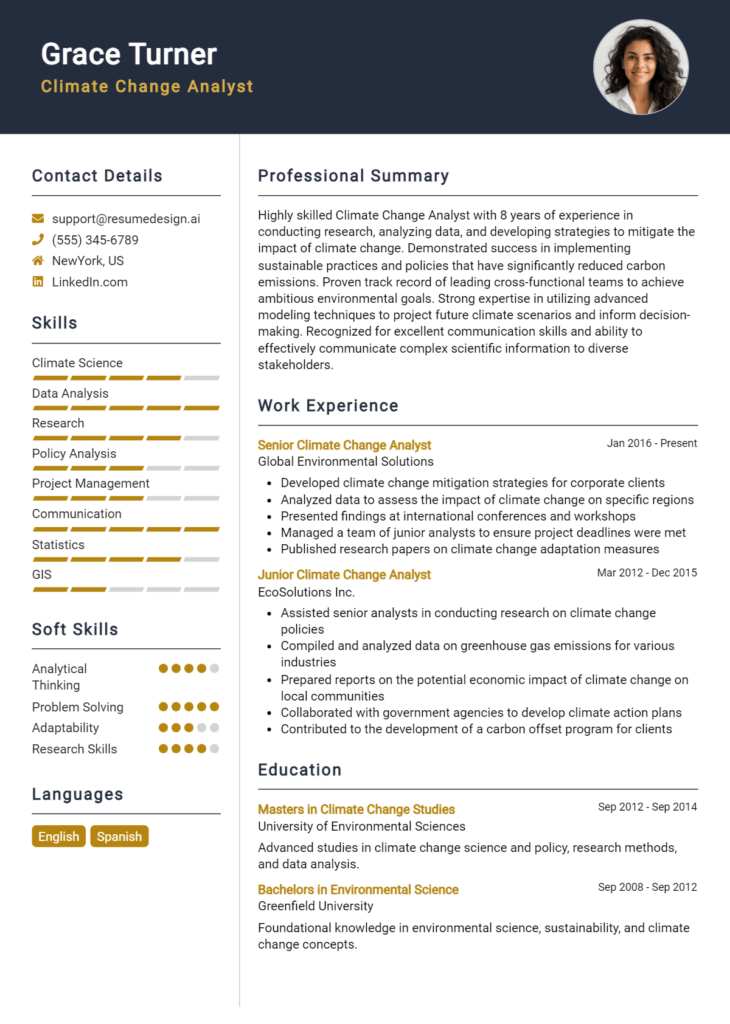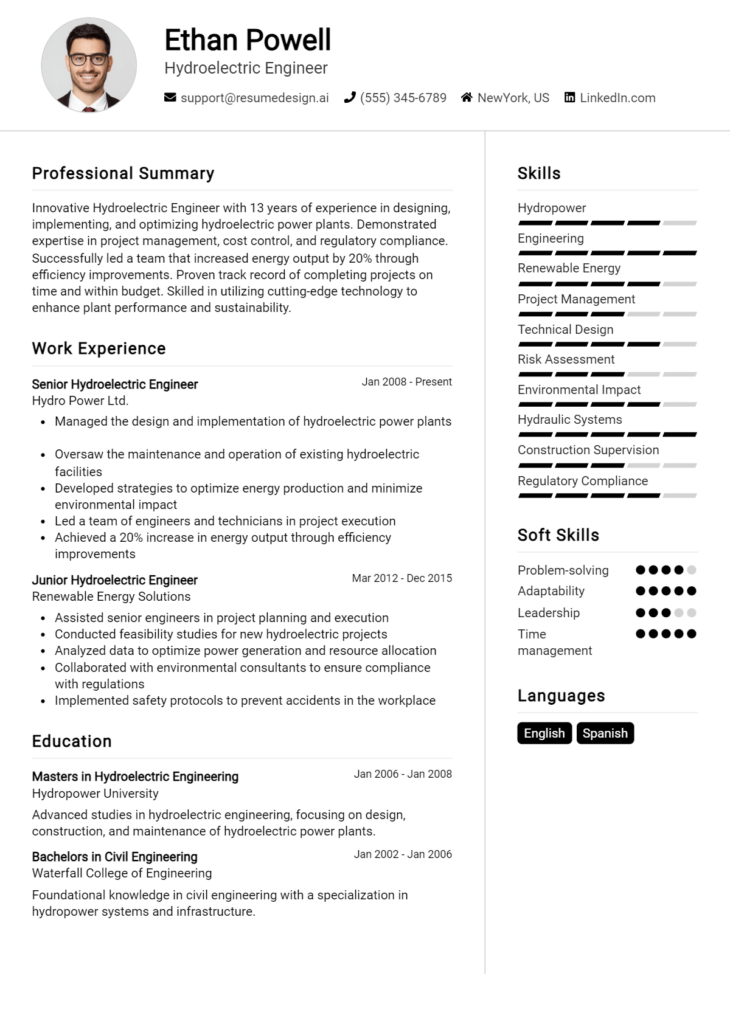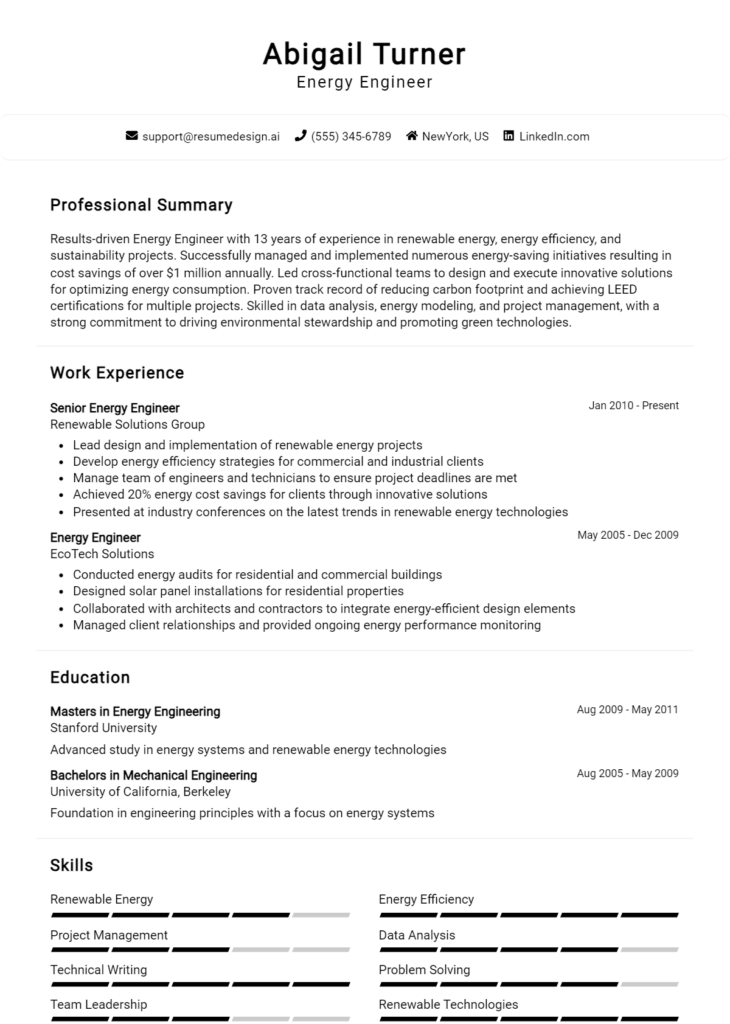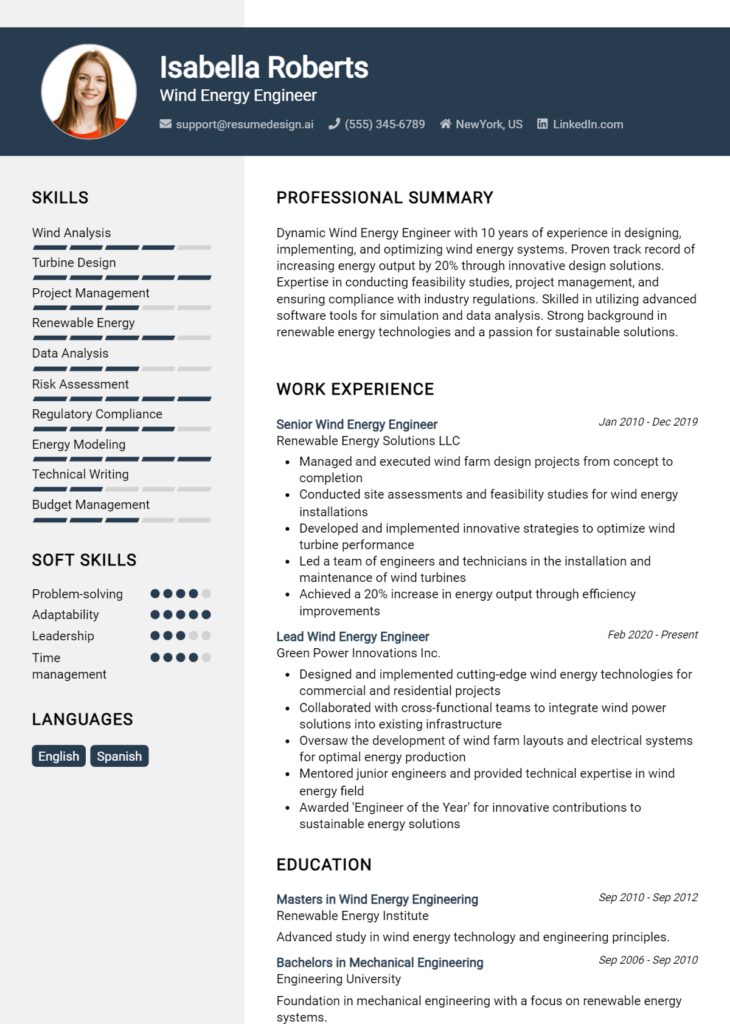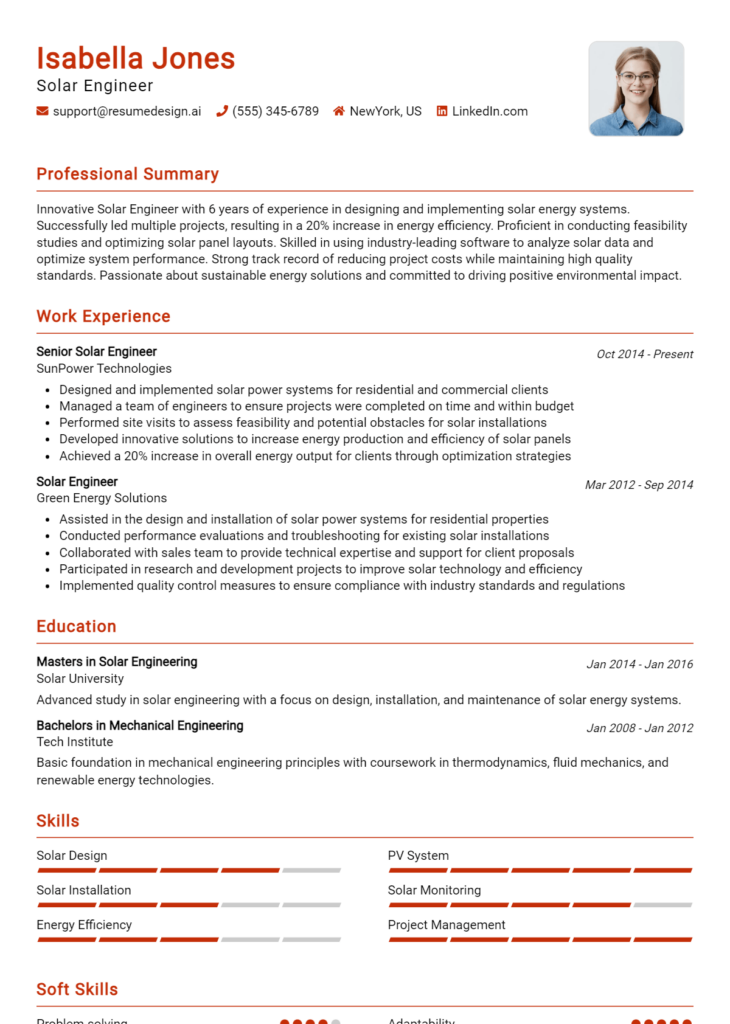Carbon Capture Engineer Core Responsibilities
A Carbon Capture Engineer is pivotal in designing and implementing technologies that capture carbon dioxide emissions from industrial processes. Key responsibilities include developing capture systems, analyzing data for efficiency, and collaborating across departments such as engineering, environmental science, and operations. Essential skills involve technical expertise in chemical engineering, operational management, and strong problem-solving abilities. These competencies ensure the successful reduction of carbon footprints, aligning with organizational sustainability goals. A well-structured resume can effectively highlight these qualifications, showcasing the candidate's ability to drive impactful change.
Common Responsibilities Listed on Carbon Capture Engineer Resume
- Design and optimize carbon capture systems for industrial applications.
- Conduct feasibility studies and assessments of carbon capture technologies.
- Collaborate with multidisciplinary teams to implement capture solutions.
- Monitor and analyze performance data to enhance system efficiency.
- Develop and maintain documentation for compliance and reporting.
- Research emerging carbon capture technologies and trends.
- Conduct risk assessments and ensure safety protocols are followed.
- Participate in training and mentorship programs for team members.
- Engage with stakeholders to communicate project progress and results.
- Provide technical support during the installation and commissioning phases.
- Evaluate cost implications and contribute to budget management for projects.
High-Level Resume Tips for Carbon Capture Engineer Professionals
In today's competitive job market, a well-crafted resume is crucial for Carbon Capture Engineer professionals looking to make a strong first impression on potential employers. Your resume is often the first glimpse hiring managers have of your qualifications, and it needs to effectively showcase both your technical skills and notable achievements in the field of carbon capture technology. A compelling resume not only highlights your expertise but also conveys your passion for sustainability and innovation. This guide will provide practical and actionable tips specifically tailored for Carbon Capture Engineer professionals, helping you stand out in this vital industry.
Top Resume Tips for Carbon Capture Engineer Professionals
- Tailor your resume to match the job description by using relevant keywords and phrases that align with the specific requirements of the position.
- Showcase your relevant experience in carbon capture technologies, including specific projects you've worked on and the roles you played.
- Quantify your achievements by providing measurable results, such as the percentage of carbon emissions reduced or the volume of CO2 captured through your initiatives.
- Highlight industry-specific skills, such as proficiency in simulation software, knowledge of carbon capture processes, and familiarity with environmental regulations.
- Include relevant certifications or training in carbon capture technologies, engineering principles, or environmental science to enhance your credibility.
- Demonstrate your problem-solving abilities by including examples of challenges you faced in projects and how you overcame them.
- Use clear and concise language, ensuring that technical jargon is understandable to a non-specialist audience, particularly in the summary and objective sections.
- Incorporate professional development experiences, such as conferences, workshops, or research projects, to show your commitment to staying current in the field.
- Utilize a clean and professional format that makes your resume easy to read, ensuring key information stands out.
By implementing these tips, you can significantly increase your chances of landing a job in the Carbon Capture Engineer field. A polished and tailored resume that effectively highlights your skills and achievements will not only attract the attention of hiring managers but also set you apart as a qualified candidate committed to advancing carbon capture technologies and contributing to a sustainable future.
Why Resume Headlines & Titles are Important for Carbon Capture Engineer
In the competitive field of carbon capture engineering, a well-crafted resume headline or title serves as a crucial first impression for candidates. This brief yet impactful phrase not only grabs the attention of hiring managers but also effectively summarizes a candidate's key qualifications and relevance to the job at hand. A strong headline should be concise, relevant, and directly related to the specific position being applied for, allowing potential employers to quickly identify the applicant's expertise and suitability for the role.
Best Practices for Crafting Resume Headlines for Carbon Capture Engineer
- Keep it concise: Aim for one to two lines that summarize your qualifications.
- Be role-specific: Tailor your headline to reflect the specific position, such as "Senior Carbon Capture Engineer" or "Innovative Carbon Capture Specialist."
- Highlight key skills: Include your most relevant skills, such as "Expert in CO2 Capture Technologies."
- Incorporate metrics: Use quantifiable achievements when possible, e.g., "Reduced emissions by 30% through innovative design."
- Use industry keywords: Utilize terminology that is relevant to carbon capture engineering to pass through applicant tracking systems.
- Showcase your experience level: Indicate your years of experience or level of expertise, such as "5+ Years in Carbon Capture Engineering."
- Make it impactful: Use strong adjectives that convey your strengths, such as "Dynamic," "Proven," or "Strategic."
- Avoid clichés: Steer clear of overused terms that do not add value, like "Hardworking" or "Team Player."
Example Resume Headlines for Carbon Capture Engineer
Strong Resume Headlines
Innovative Carbon Capture Engineer with 7+ Years in CO2 Reduction Technologies
Proven Track Record in Large-Scale Carbon Capture Implementation and Design
Dynamic Carbon Capture Specialist - Achieved 40% Emission Reduction in Key Projects
Weak Resume Headlines
Engineer Looking for Opportunities
Professional with Experience in Engineering
The strong headlines provided are effective because they are specific, quantifiable, and tailored to the carbon capture engineering role, allowing hiring managers to immediately recognize the candidate’s qualifications. They convey a sense of expertise and achievement that sets the candidate apart. In contrast, the weak headlines lack detail and clarity, offering no real insight into the candidate's skills or accomplishments, which can result in them being overlooked in favor of more compelling options.
Writing an Exceptional Carbon Capture Engineer Resume Summary
A well-crafted resume summary is crucial for a Carbon Capture Engineer, as it serves as the first impression a candidate makes on hiring managers. This brief yet powerful section succinctly highlights key skills, relevant experience, and notable accomplishments, drawing attention in a competitive job market. A strong summary should be concise, impactful, and tailored to the specific job at hand, ensuring that it resonates with the employer's needs and sets the stage for the details that follow.
Best Practices for Writing a Carbon Capture Engineer Resume Summary
- Quantify achievements: Use specific numbers to demonstrate the impact of your contributions, such as percentages or project sizes.
- Focus on relevant skills: Highlight technical skills and tools specific to carbon capture technologies.
- Tailor the summary: Customize your summary for each job application by matching it to the job description and requirements.
- Keep it concise: Limit the summary to 2-4 sentences to maintain clarity and impact.
- Use action verbs: Start sentences with strong action verbs to convey a sense of proactivity and results.
- Showcase industry knowledge: Mention familiarity with current technologies and trends in carbon capture and environmental engineering.
- Highlight teamwork and leadership: If applicable, emphasize your ability to work collaboratively or lead projects within multidisciplinary teams.
- Include certifications: If you have relevant certifications or licenses, briefly mention them to add credibility.
Example Carbon Capture Engineer Resume Summaries
Strong Resume Summaries
Results-driven Carbon Capture Engineer with over 5 years of experience in designing and implementing innovative CO2 capture solutions, leading to a 30% increase in efficiency for commercial projects. Proven expertise in utilizing advanced membrane technology and process optimization, contributing to the reduction of greenhouse gas emissions by 50,000 tons annually.
Detail-oriented engineer with a Master’s degree in Environmental Engineering and 7 years of hands-on experience in carbon capture systems. Successfully managed a $2 million project that improved carbon capture rates by 40% while maintaining compliance with environmental regulations.
Experienced Carbon Capture Engineer with a strong background in process engineering and a proven track record of implementing cost-effective carbon sequestration technologies. Achieved a 25% reduction in operational costs through innovative system design and optimization in a large-scale pilot project.
Weak Resume Summaries
Engineer with experience in environmental projects. Good at working with teams and understanding technology.
Motivated professional seeking opportunities in carbon capture engineering. Familiar with various engineering concepts and practices.
The strong resume summaries are effective because they provide specific, quantifiable achievements and directly relate to the role of a Carbon Capture Engineer. They include measurable results and relevant technical skills that align with potential employer needs. Conversely, the weak summaries lack detail and specificity, making them less impactful and memorable. They fail to convey the candidate's qualifications clearly, and as a result, do not engage hiring managers effectively.
Work Experience Section for Carbon Capture Engineer Resume
The work experience section of a Carbon Capture Engineer resume is critical for demonstrating the candidate's technical skills, leadership capabilities, and ability to deliver high-quality projects. This section provides prospective employers with concrete evidence of the candidate's practical experience and accomplishments within the carbon capture field. By quantifying achievements and aligning the described experience with industry standards, candidates can effectively showcase their value and relevance to potential employers. It is essential to illustrate both the technical expertise and the collaborative efforts that contribute to successful carbon capture initiatives.
Best Practices for Carbon Capture Engineer Work Experience
- Highlight specific technical skills relevant to carbon capture technologies, such as knowledge of carbon separation processes or familiarity with capture equipment.
- Quantify achievements using metrics, like the amount of CO2 captured or reductions in emissions, to demonstrate impact.
- Emphasize leadership roles in projects, detailing how you managed teams and coordinated efforts to meet project goals.
- Include examples of collaboration with cross-functional teams to showcase effective communication and teamwork.
- Align experiences with industry standards and practices to demonstrate familiarity with current methodologies.
- Use action verbs to convey responsibility and initiative, such as "designed," "implemented," or "led."
- Focus on continuous improvement efforts, such as optimizing processes or enhancing efficiency in projects.
- Tailor your experiences to the job description to highlight the most relevant qualifications for each application.
Example Work Experiences for Carbon Capture Engineer
Strong Experiences
- Led a team of engineers in the design and implementation of a carbon capture system that reduced emissions by 30%, resulting in a $1M annual cost savings for the facility.
- Developed and optimized a novel carbon absorption process that increased CO2 capture efficiency by 15%, contributing to a project that received national recognition for innovation.
- Collaborated with environmental scientists to assess the impact of carbon capture technologies on local ecosystems, resulting in a comprehensive report that informed future project developments.
- Managed a cross-disciplinary team of 10, successfully completing a carbon capture pilot project ahead of schedule and under budget, leading to a full-scale implementation contract.
Weak Experiences
- Worked on carbon capture projects.
- Assisted in some engineering tasks related to carbon capture.
- Helped with team meetings and discussions about carbon capture technologies.
- Contributed to projects in the environmental engineering field.
The examples labeled as strong experiences are considered effective because they provide specific details about accomplishments, quantify results, and illustrate leadership and collaboration. In contrast, the weak experiences lack clarity, measurable outcomes, and substantial contributions, making them less impactful in demonstrating the candidate's qualifications in the carbon capture engineering field.
Education and Certifications Section for Carbon Capture Engineer Resume
The education and certifications section of a Carbon Capture Engineer resume is crucial in showcasing a candidate's academic credentials and industry-relevant qualifications. This section not only highlights the foundational knowledge gained through formal education but also emphasizes the importance of continuous learning and professional development through certifications. By including relevant coursework and specialized training, candidates can significantly enhance their credibility and demonstrate their commitment to staying updated with evolving technologies and practices in carbon capture and climate change mitigation. Such an approach aligns the candidate's profile with the specific demands of the job role, making them a more attractive prospect to potential employers.
Best Practices for Carbon Capture Engineer Education and Certifications
- Focus on relevant degrees such as Environmental Engineering, Chemical Engineering, or related fields.
- Include industry-recognized certifications, such as Certified Carbon Capture Specialist (CCCS) or similar credentials.
- Detail relevant coursework that demonstrates expertise in carbon capture technologies, thermodynamics, and environmental science.
- Highlight any specialized training programs or workshops that focus on innovative carbon capture methods.
- Keep the information up-to-date, ensuring that all entries reflect the latest qualifications.
- Use clear and concise formatting to make the section easily readable for hiring managers.
- Emphasize any interdisciplinary studies that showcase a comprehensive understanding of related fields.
- Consider including memberships in professional organizations related to carbon capture and environmental engineering.
Example Education and Certifications for Carbon Capture Engineer
Strong Examples
- B.S. in Chemical Engineering, University of California, Berkeley
- Certified Carbon Capture Specialist (CCCS), Global Carbon Capture Institute
- Relevant Coursework: Advanced Carbon Capture Technologies, Environmental Impact Assessment, and Energy Systems Engineering
- Training: Carbon Capture and Storage Workshop, National Energy Technology Laboratory
Weak Examples
- B.A. in History, State University
- Certification in Basic Excel Skills, Online Learning Platform
- Relevant Coursework: Introduction to Psychology, Art History
- Outdated Certification: Environmental Management Systems (ISO 14001) from 2005
The examples listed above are considered strong because they directly relate to the field of carbon capture engineering and showcase pertinent education and certifications that enhance the candidate's qualifications. In contrast, the weak examples highlight irrelevant degrees and outdated certifications that do not align with the current demands of the job role, potentially diminishing the candidate's appeal to employers in the carbon capture industry.
Top Skills & Keywords for Carbon Capture Engineer Resume
In the rapidly evolving field of carbon capture technology, having a well-crafted resume is essential for aspiring Carbon Capture Engineers. Highlighting the right skills can make a significant difference in standing out to potential employers. A strong resume showcases both hard and soft skills that demonstrate not only technical proficiency but also the ability to work collaboratively in a multidisciplinary environment. The importance of these skills cannot be overstated, as they reflect an engineer's capability to contribute effectively to projects aimed at reducing carbon emissions and combating climate change. By emphasizing the right skills and relevant work experience, candidates can increase their chances of securing a position in this vital industry.
Top Hard & Soft Skills for Carbon Capture Engineer
Soft Skills
- Problem-solving
- Critical thinking
- Team collaboration
- Communication skills
- Adaptability
- Attention to detail
- Project management
- Time management
- Creativity
- Interpersonal skills
- Analytical mindset
- Leadership abilities
- Conflict resolution
- Initiative
- Negotiation skills
Hard Skills
- Knowledge of carbon capture technologies
- Proficiency in simulation software (e.g., Aspen Plus, COMSOL)
- Understanding of thermodynamics and fluid dynamics
- Data analysis and modeling
- Experience with carbon capture systems (e.g., amine scrubbing)
- Familiarity with environmental regulations and compliance
- Proficient in computer-aided design (CAD) software
- Laboratory skills and experimental design
- Knowledge of environmental impact assessments
- Experience in process engineering
- Technical writing and reporting
- Knowledge of renewable energy systems
- Understanding of life cycle assessment (LCA)
- Proficiency in statistical analysis software
- Knowledge of carbon storage and sequestration methods
- Familiarity with project lifecycle management tools
- Quality assurance and control methods
- Safety standards and risk management practices
Stand Out with a Winning Carbon Capture Engineer Cover Letter
As a passionate Carbon Capture Engineer with a solid background in environmental engineering and a commitment to sustainability, I am excited to apply for the Carbon Capture Engineer position at [Company Name]. With a Master’s degree in Environmental Engineering and over five years of hands-on experience in designing and implementing carbon capture technologies, I am well-equipped to contribute to your team’s mission of reducing greenhouse gas emissions and advancing innovative solutions in carbon management.
In my previous role at [Previous Company Name], I successfully led a project that focused on the development of a novel absorption process for capturing CO2 from industrial emissions. By integrating advanced materials and optimizing operational parameters, we achieved a 30% increase in capture efficiency while significantly reducing costs. My expertise in using simulation software to model carbon capture processes enables me to identify potential improvements swiftly and effectively, ensuring that our projects meet both performance and sustainability targets.
Collaboration is key in the field of carbon capture, and I pride myself on my ability to work effectively with multidisciplinary teams. I have successfully coordinated efforts with researchers, chemists, and engineers to develop integrated solutions that not only capture carbon but also utilize it in ways that benefit both the environment and the economy. My strong communication skills allow me to convey complex technical concepts to non-technical stakeholders, fostering a shared understanding of our goals and progress.
I am genuinely enthusiastic about the opportunity to work with [Company Name] and contribute to its pioneering efforts in carbon capture technology. I am confident that my technical skills, project management experience, and passion for sustainability make me a strong candidate for this role. I look forward to the possibility of discussing how I can help advance [Company Name]'s initiatives in carbon capture and contribute to a more sustainable future. Thank you for considering my application.
Common Mistakes to Avoid in a Carbon Capture Engineer Resume
When crafting a resume for the role of a Carbon Capture Engineer, it's essential to present your skills, experience, and knowledge effectively. However, many candidates make common mistakes that can hinder their chances of landing an interview. Avoiding these pitfalls will help ensure that your resume stands out in a competitive job market and accurately reflects your qualifications for this specialized field.
Neglecting Relevant Keywords: Failing to incorporate industry-specific terminology and keywords can result in your resume being overlooked by applicant tracking systems (ATS) that many employers use to filter candidates.
Vague Job Descriptions: Providing unclear or overly generic descriptions of past roles can leave hiring managers confused about your actual contributions and expertise. Be specific about your responsibilities and achievements.
Lack of Quantifiable Achievements: Not including measurable outcomes of your work can make it difficult for employers to understand the impact you've had in previous positions. Use numbers to demonstrate your successes (e.g., "improved carbon capture efficiency by 20%").
Ignoring Soft Skills: While technical expertise is crucial, overlooking the importance of soft skills such as communication, teamwork, and problem-solving can be detrimental. Highlight how these skills have contributed to your success as an engineer.
Too Much Technical Jargon: While it's important to showcase your technical knowledge, overloading your resume with jargon can alienate readers who may not be familiar with every term. Aim for clarity and balance.
Poor Formatting: Using an unorganized or cluttered layout can make your resume difficult to read. Ensure that it is well-structured, using headings, bullet points, and adequate spacing to enhance readability.
Failing to Tailor the Resume: Sending out a generic resume without tailoring it to the specific job description can signal a lack of genuine interest. Customize your resume for each application to highlight the most relevant experiences and skills.
Omitting Continuing Education and Certifications: In a rapidly evolving field like carbon capture, neglecting to mention relevant certifications, courses, or workshops can make you seem less committed to professional development. Always include these details to showcase your dedication to staying current.
Conclusion
As the need for sustainable solutions continues to grow, the role of a Carbon Capture Engineer has become increasingly vital in combatting climate change. This article explored the key responsibilities of a Carbon Capture Engineer, which include designing and implementing technologies to capture and store carbon dioxide emissions from various sources. We also discussed the importance of staying updated with the latest advancements in carbon capture technologies, regulatory frameworks, and environmental policies, as well as the collaboration required with multidisciplinary teams to effectively address complex challenges.
In addition, we highlighted the essential skills and qualifications needed for this role, such as a strong background in engineering, environmental science, and proficiency in data analysis. The article emphasized the significance of practical experience, whether through internships, research projects, or hands-on work with carbon capture systems.
As you reflect on your qualifications for this growing field, now is the perfect time to review and enhance your Carbon Capture Engineer resume. Make sure it effectively showcases your skills, experiences, and achievements that align with this important role. To assist you in this process, consider utilizing available tools such as resume templates, a resume builder, resume examples, and cover letter templates. Taking these steps can help you stand out in the competitive job market and advance your career in carbon capture engineering.

